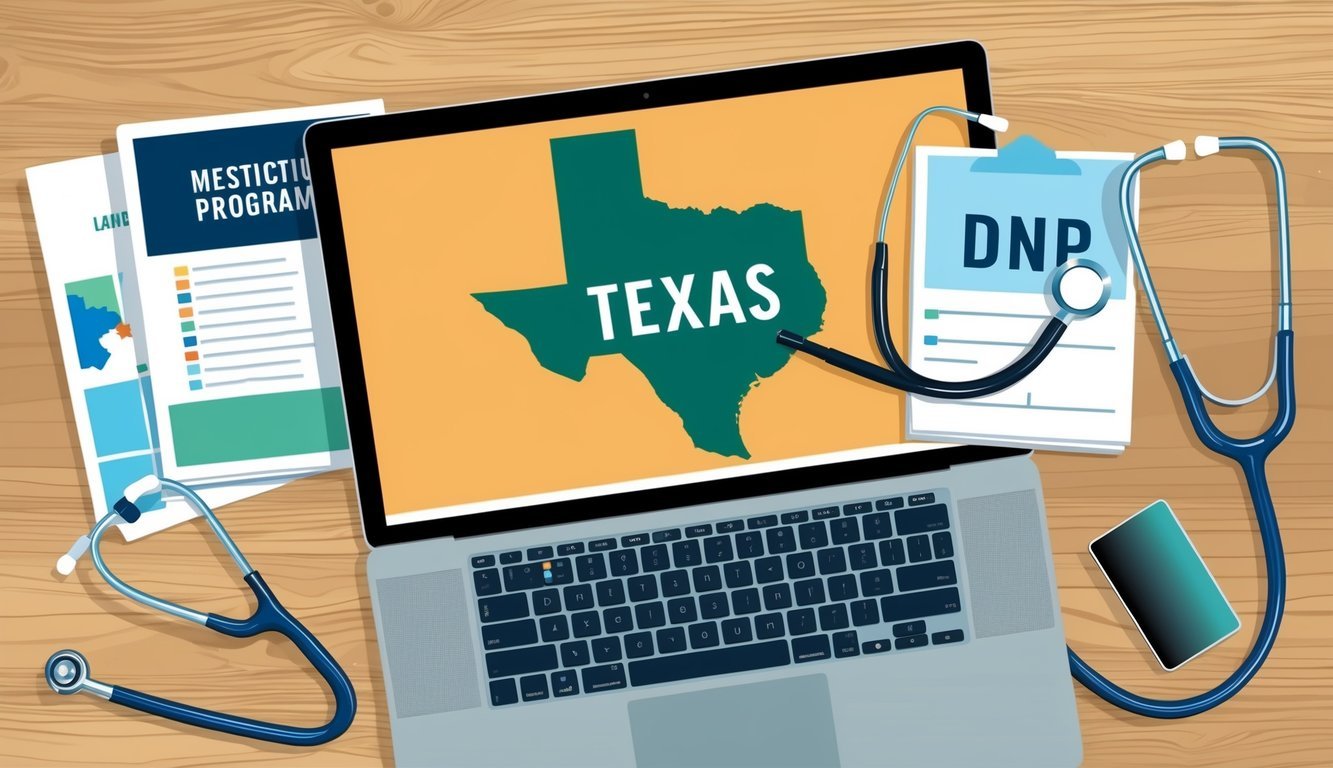The journey from BSN to DNP can significantly advance your nursing career.
Texas offers various BSN to DNP programs that cater to aspiring nurses who want to specialize in advanced practice roles.
These programs not only enhance your clinical skills but also prepare you for leadership positions in healthcare.
In Texas, academic institutions provide several specializations, including nurse practitioner roles and nurse anesthesia.
Many of these programs are designed with flexibility in mind, offering online and hybrid formats to accommodate your busy schedule.
This makes it easier for you to balance work, life, and education while pursuing your advanced degree.
As you explore these programs, consider the clinical and research components that are essential to DNP education.
Understanding what each program offers will help you make an informed decision that aligns with your career goals and patient care aspirations.
Key Takeaways
- Texas has diverse BSN to DNP programs with various specializations.
- Many institutions offer flexible online and hybrid learning options.
- Clinical experience is a crucial part of DNP education in Texas.
Overview of BSN to DNP Programs
BSN to DNP programs offer a pathway for registered nurses with a Bachelor of Science in Nursing (BSN) to advance their education and skills through a Doctor of Nursing Practice (DNP) degree.
These programs focus on developing clinical expertise, leadership abilities, and a commitment to lifelong learning in nursing education and practice.
Transition from BSN to DNP
The transition from a BSN to a DNP program typically involves a rigorous curriculum designed to prepare you for advanced nursing roles.
These programs often require around 28-36 months to complete, depending on the institution.
The coursework emphasizes a blend of theory and practical experience.
You will study subjects such as advanced health assessment, nursing leadership, evidence-based practice, and health policy.
Many programs offer various specialties like Family Nurse Practitioner or Acute Care Nurse Practitioner.
Key aspects of the transition:
- Clinical Hours: You will need to complete a specific number of clinical hours to gain hands-on experience.
- Capstone Project: Most DNP programs require a final project to demonstrate your expertise and application of knowledge in a real-world setting.
Benefits of DNP Programs
Enrolling in a DNP program has several significant benefits that can enhance your nursing career.
Graduates often experience improved job prospects and increased earning potential.
The average salary for DNP degree holders can range from approximately $128,490 to $162,460 annually, depending on your location and role.
DNP programs also prepare you to take on leadership roles in healthcare settings.
You can apply your skills in nursing education, policy-making, and clinical practice, ultimately improving patient outcomes.
Benefits of pursuing a DNP:
- Advanced Knowledge: You gain in-depth knowledge of evidence-based practices, which can be applied to improve care delivery.
- Leadership Opportunities: The DNP prepares you for roles in healthcare leadership, shaping future nursing practice.
For more information about BSN to DNP programs, refer to resources like NurseJournal.org and NursingProcess.org.
Exploring DNP Specializations in Texas

Texas offers a wide range of Doctor of Nursing Practice (DNP) specializations that cater to various interests and career goals.
These paths allow you to enhance your skills and knowledge in advanced nursing practice, leading to better patient care and leadership opportunities.
Family Nurse Practitioner
As a Family Nurse Practitioner (FNP), you focus on providing comprehensive healthcare to individuals and families across their lifespan.
You will gain skills in assessment, diagnosis, and management of common medical conditions.
The curriculum often includes coursework in pediatrics, geriatrics, and women’s health.
DNP programs in Texas, like those at the University of Texas Health Science Center – Houston, prepare you for board certification, equipping you to work in diverse settings, from clinics to private practices.
Executive Nurse Leadership
The Executive Nurse Leadership specialization prepares you for roles in healthcare management and administration.
You will learn about healthcare policy, financial management, and strategic planning.
Programs typically cover leadership theories and their application in healthcare settings.
Graduates often assume roles such as nurse managers or healthcare executives, where they can influence organizational outcomes and improve patient care.
Institutions like Texas A&M University offer strong DNP programs emphasizing this track.
Nurse Anesthesia
Nurse Anesthesia focuses on the advanced practice of administering anesthesia and managing patients during surgical procedures.
The DNP programs prepare you for the certification exam required to become a Certified Registered Nurse Anesthetist (CRNA).
You’ll study pharmacology, physiology, and anesthesia management in depth.
This specialization allows you to work in various environments, including hospitals and outpatient surgical centers.
Texas is home to several esteemed programs like the one at The University of Texas at Austin, ensuring you receive high-quality training.
Pediatric Nurse Practitioner
Pediatric Nurse Practitioners (PNPs) specialize in the care of infants, children, and adolescents.
You will learn to assess, diagnose, and treat a wide range of pediatric illnesses.
Training often includes nutrition, growth and development, and family dynamics.
Many DNP programs, such as those at Texas Tech University Health Sciences Center, offer robust pediatric tracks.
Upon graduation, you can work in primary care settings, schools, or specialty clinics.
Adult-Gerontology Acute Care Nurse Practitioner
This specialization focuses on caring for adults, particularly those with acute and complex health conditions.
It covers critical care management and chronic disease management.
DNP programs emphasize hands-on clinical experiences, preparing you to assess and treat patients effectively.
Graduates may work in hospitals, emergency rooms, or specialty clinics.
Institutions like UTMB School of Nursing offer specialized training that aligns with these career pathways.
Psychiatric Mental Health Nurse Practitioner
Psychiatric Mental Health Nurse Practitioners (PMHNPs) focus on mental health disorders across the lifespan.
You will gain expertise in diagnosing and managing mental health conditions, providing therapy, and prescribing medications.
The curriculum usually covers psychotherapy techniques and psychopharmacology.
Programs, such as those offered by Texas State University, equip you to address the increasing demand for mental health services in various practice settings.
Nurse-Midwifery
Nurse-Midwifery emphasizes prenatal, labor, and postpartum care.
You will learn about normal pregnancy, childbirth, and women’s health.
The DNP programs focus on evidence-based practice and comprehensive care for mothers and newborns.
Graduates can work in hospitals, birthing centers, or their own practices, offering support during labor and delivery.
Academic Institutions Offering DNP Programs in Texas

Texas hosts several top-tier academic institutions providing Doctor of Nursing Practice (DNP) programs.
These programs cater to various specialties, equipping nurses with advanced skills in leadership, research, and clinical practice.
University of Texas Health Science Center at Houston
The University of Texas Health Science Center at Houston offers a comprehensive DNP program aimed at preparing advanced practice nurses.
The BSN-to-DNP tracks focus on areas like Nurse Practitioner and Nursing Leadership.
Students benefit from a curriculum that integrates evidence-based practice and clinical expertise.
The faculty includes experienced professionals who support students in achieving their career goals.
You can explore more about their programs through their official website.
Texas Christian University
Texas Christian University (TCU) is known for its high-quality DNP programs.
Their curriculum emphasizes interprofessional education and focuses on practical experiences that enhance clinical skills.
The faculty at TCU are dedicated to mentoring students.
Their program prepares graduates for leadership roles in diverse healthcare settings.
TCU also offers a supportive environment for students to thrive in their academic and professional pursuits.
Learn more from their website.
Baylor University
Baylor University provides a robust DNP program designed for registered nurses advancing their careers.
The program focuses on preparing students for roles such as family nurse practitioner and healthcare administration.
Baylor’s emphasis on research and evidence-based practice ensures you gain the necessary skills to address complex health issues.
Additionally, their faculty are leaders in nursing education, guiding students through rigorous training.
Check more details on their program page.
University of the Incarnate Word
The University of the Incarnate Word (UIW) offers a DNP program that aims to produce clinicians ready to impact their communities.
The program includes both online and on-campus options tailored to fit your needs.
UIW’s DNP program emphasizes cultural competence and prepares graduates for diverse patient populations.
Faculty members are dedicated to student success and work on providing personalized support throughout the program.
More information is available on their official site.
Texas Tech University Health Sciences Center
Texas Tech University Health Sciences Center offers an innovative DNP program focused on developing healthcare leaders.
The program is designed to enhance your clinical skills and prepare you for advanced practice roles.
TTUHSC features a supportive faculty committed to mentoring students.
Their emphasis on team-based care and community service prepares students to meet the healthcare demands of a complex society.
Explore their offerings at their website.
University of Texas Health Science Center at San Antonio
The University of Texas Health Science Center at San Antonio provides a DNP program aimed at transforming nursing practice.
The curriculum emphasizes leadership, health policy, and clinical practice, catering to various nurse specialties.
Students engage in hands-on experiences that promote real-world application of skills.
Their faculty brings a wealth of experience, ensuring you receive a well-rounded education.
Additional details can be found on their program site.
Cizik School of Nursing at Texas Medical Center
Cizik School of Nursing at the Texas Medical Center offers a DNP program with various specialties, including nurse anesthesia and pediatric nursing.
The curriculum is designed to prepare you for clinical practice and leadership roles in various healthcare settings.
Cizik emphasizes collaboration with healthcare professionals, which enriches the learning experience.
Experienced faculty provide mentorship and support as you navigate the program.
Online and Hybrid DNP Program Modalities

Online and hybrid Doctor of Nursing Practice (DNP) programs offer flexibility and accessibility for nursing professionals.
You can pursue advanced education while balancing work and personal commitments.
These modalities appeal to those who want to enhance their nursing practice and serve diverse populations effectively.
Benefits of Online Learning
Choosing an online DNP program provides several key advantages.
First, you enjoy flexibility to study at your own pace.
This can be particularly beneficial for busy nurses who need to manage their careers and family obligations.
Online programs also promote lifelong learning, allowing you to access diverse resources and interact with peers nationwide.
This diversity enriches your learning experience, exposing you to various perspectives in nursing education.
Additionally, many online DNP programs, such as those at the University of Texas Arlington, provide CCNE-accredited courses that enhance your credentials and job prospects.
Hybrid Program Structures
Hybrid DNP programs combine online coursework and in-person experiences.
This structure includes lecture-based courses and hands-on clinical practice, giving you the best of both worlds.
For example, the University of Texas Health Science offers a blend of online classes and local clinical placements.
This allows you to apply theoretical knowledge directly to practice in your community.
Moreover, hybrid programs cater to your learning style.
If you prefer face-to-face interactions, the in-person sessions provide support and networking opportunities.
Evaluating various hybrid options can help you find a program that suits your needs while advancing your nursing education.
Clinical and Research Components of DNP Education

The Doctor of Nursing Practice (DNP) education emphasizes both clinical training and research to prepare you for advanced nursing roles.
These components enhance your ability to improve patient outcomes and implement evidence-based care in various healthcare settings.
DNP Project and Evidence-Based Practice
A key element of DNP programs is the DNP project, which focuses on implementing a change in practice based on research and evidence.
This project allows you to address real-world issues in your clinical setting, promoting quality improvement and enhancing patient care.
You will conduct a thorough literature review, assess current practices, and develop a comprehensive plan to implement necessary changes.
The DNP project reinforces the application of evidence-based practice, ensuring that your decisions are informed by the latest nursing science and healthcare informatics.
Clinical Training and Interprofessional Collaboration
Clinical training is critical in your preparation as a nurse practitioner.
It provides hands-on learning experiences that integrate theory with practice.
You will engage in various clinical settings, allowing you to develop skills in health promotion and public health initiatives.
Additionally, interprofessional collaboration is emphasized throughout the DNP program.
Working with professionals from different healthcare backgrounds enhances your understanding of multidisciplinary approaches to patient care.
This collaboration leads to improved patient outcomes and facilitates a holistic approach to healthcare delivery.
Frequently Asked Questions

This section provides answers to common questions regarding BSN to DNP programs in Texas.
You will find information about top programs, program duration, costs, online availability, entry requirements, and potential salaries for DNP graduates.
What are the top accredited BSN to DNP programs in Texas?
Some of the top accredited BSN to DNP programs in Texas include the University of Texas Health Science Center and Baylor University.
The University of Houston also offers a highly regarded program with various specialties.
You can explore more details about these programs here.
What is the typical duration of BSN to DNP programs in Texas?
Typically, BSN to DNP programs in Texas last between three to four years.
The duration can depend on your course load and whether you study part-time or full-time.
How does the cost of BSN to DNP programs in Texas compare?
The cost of BSN to DNP programs in Texas varies significantly among schools.
On average, you might expect to pay between $30,000 and $70,000 for the entire program.
It is essential to check with specific schools for exact tuition rates and additional fees.
Are there online BSN to DNP programs available in Texas?
Yes, many universities in Texas offer online BSN to DNP programs.
Baylor University is one example that allows you to complete your degree online while maintaining flexibility in your schedule.
You can find more information about online options here.
What are the entry requirements for BSN to DNP programs in the Houston area?
In the Houston area, schools generally require a BSN from an accredited institution, a minimum GPA of 3.0, and at least one year of nursing experience.
Some programs may also request letters of recommendation and a personal statement.
What is the average salary for a DNP graduate in Texas?
The average salary for a DNP graduate in Texas varies based on factors like specialization and location.
On average, DNP graduates can expect to earn between $90,000 and $120,000 per year.
Salaries can increase with experience and additional certifications.

